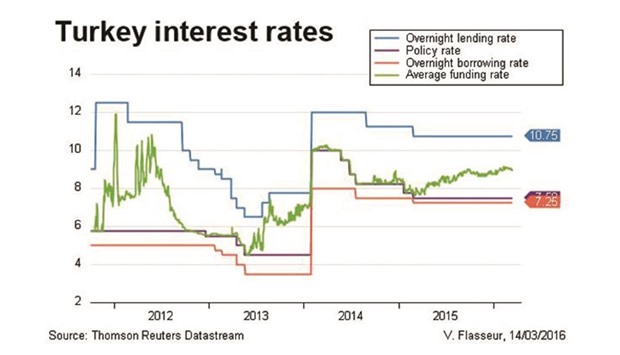Turkey’s deepening confrontation with terrorism has done nothing to deter the hot money that has driven a market rally the past month.
Even after a car bomb exploded Sunday night 200 metres from the prime minister’s office in Ankara, killing at least 37 people, Turkish bonds gained for a fifth day on Monday.
The reason? Turkish debt offers the highest yields in emerging Europe. That’s been enough to attract investors chasing returns as Mario Draghi’s European Central Bank cuts rates further below zero to stoke growth. Buyers from abroad boosted their holdings in the nation’s sovereign debt by the most in 19 months in February, according to central bank data. Yields on 10-year notes have fallen to 10.12% from a January high of 11.31%. Credit Suisse Group AG and Akbank TAS see scope for as much as 50 basis points of further declines.
ECB measures “could add more fuel into the recent rally in Turkish bonds,” said Nimrod Mevorach, an emerging-market strategist at Credit Suisse in London, who has a yield target of 9.50% for Turkish four-year notes, from 9.88% yesterday.
The nation’s bonds have declined more than any others in emerging markets except Peru’s in the past year. Societe Generale SA highlighted security risks as a reason to stay cautious.
Turkey’s 10-year bonds extended their rally as the government vowed to retaliate quickly following the car bomb - the third to strike Ankara in the past five months. Similar-maturity Russian notes yield 9.40%, while the rate compares with 2.88% in Poland and 0.26% in Germany.
In addition to a decline in food-price increases in February, which alleviated one of the central bank’s biggest challenges in taming inflation, policy makers are getting relief from an emerging-market currency rally that’s lifted the lira 1.6% in the past month. Annual inflation fell to a three- month low of 8.8% in February.
While many analysts predict bond-market gains will continue, they’re also seeking clarity on monetary policy as the term of the current central bank governor, Erdem Basci, draws to a close on April 19. There’s been no announcement yet on whether he will stay on for another five-year term or be replaced.
Basci has kept benchmark borrowing costs on hold for the past year even as an acceleration in inflation prompted calls for tighter policy, drawing some criticism that government officials including President Recep Tayyip Erdogan are encroaching on the body’s independence. As an alternative form of tightening, Basci’s pushed up funding costs of banks.
Another shadow lurking over Turkish assets is the tenuous security situation, while the possibility that the Federal Reserve will signal scope for more rate increases poses risks to an emerging-market rally. The explosion on Sunday highlighted the government’s struggle to prevent regional instability and violence in the southeast from spilling into key cities.
“Overall investor conviction is low” in Turkish assets, according to Roxana Hulea, an emerging-market strategist at Societe Generale in London, who said the dollar is approaching “oversold territory” against the lira. The currency weakened 0.4% to 2.8804 per dollar yesterday.
There’s still room for a bigger bond rally if inflation continues on a downward course, according to Evren Kirikoglu, a strategist at Akbank, Turkey’s second-largest listed lender by market capitalization. Foreign investors, who poured a net $947mn into Turkish bonds in February, probably continued buying last week following a five-day outflow, he said.
Underpinning the prospect for a possible resumption of rate cuts in Turkey, the three-month forward implied yield on the lira, a proxy for interest-rate expectations, fell for a fourth day to 10.67% on Friday, the lowest since December 10.

TURKEY
